小升初英语总复习-词类-2、动词课件(110张幻灯片)
文档属性
| 名称 | 小升初英语总复习-词类-2、动词课件(110张幻灯片) |  | |
| 格式 | pptx | ||
| 文件大小 | 1.4MB | ||
| 资源类型 | 教案 | ||
| 版本资源 | 人教版(PEP) | ||
| 科目 | 英语 | ||
| 更新时间 | 2021-03-17 19:41:06 | ||
图片预览

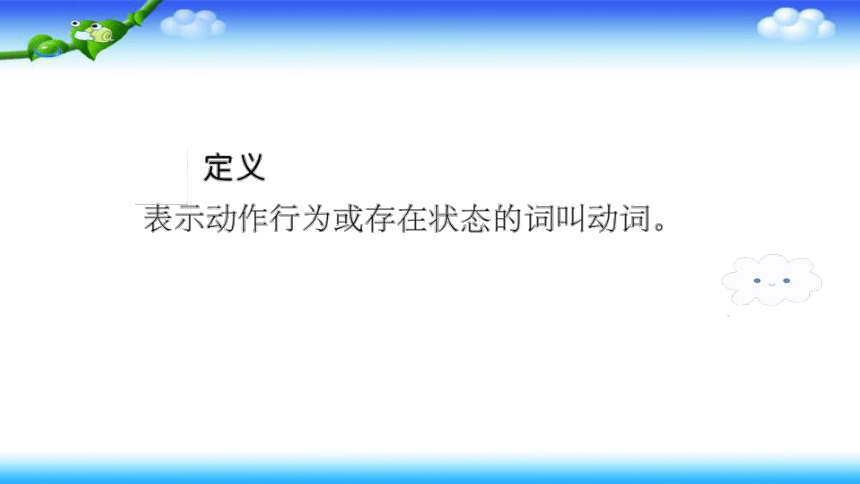
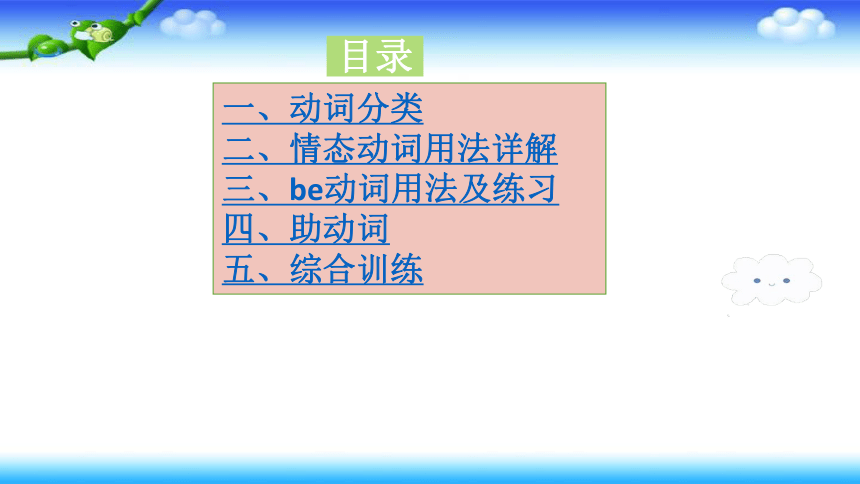
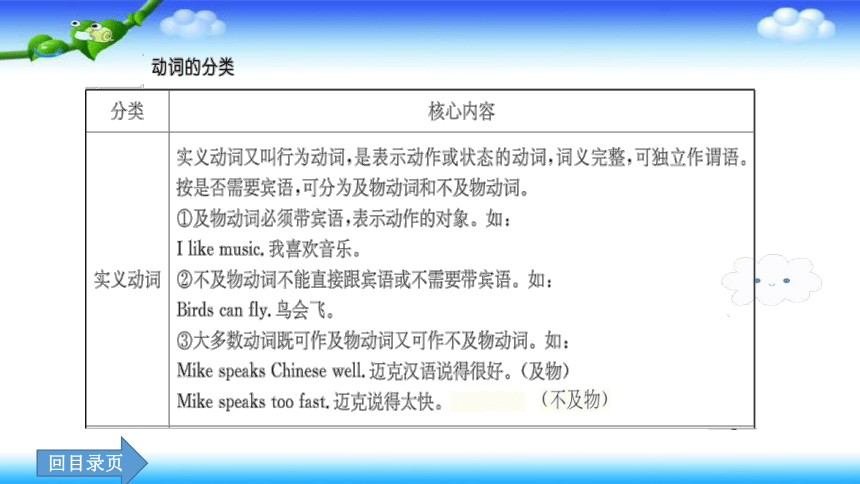
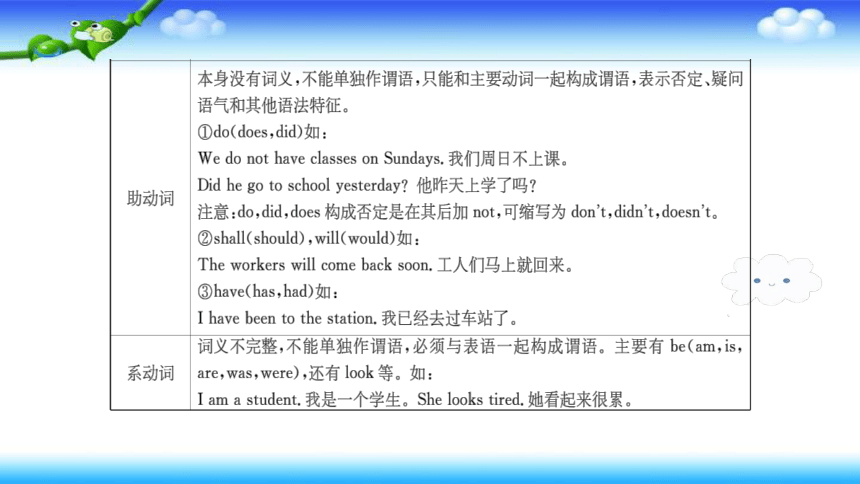



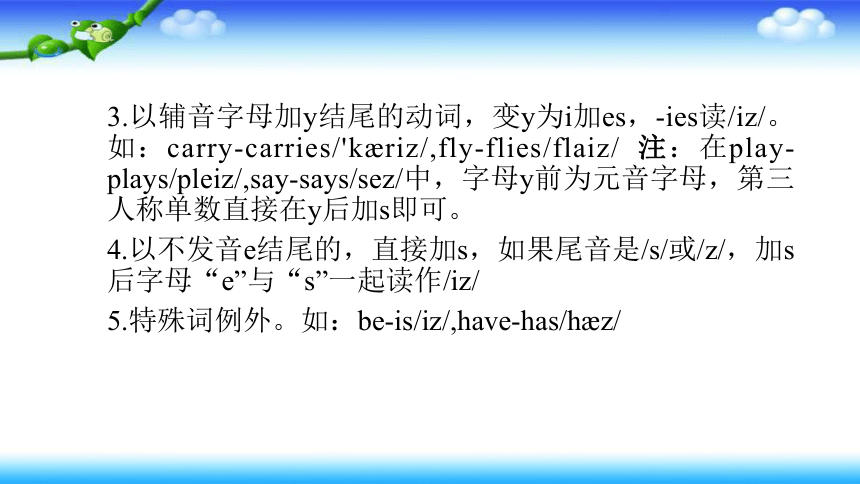
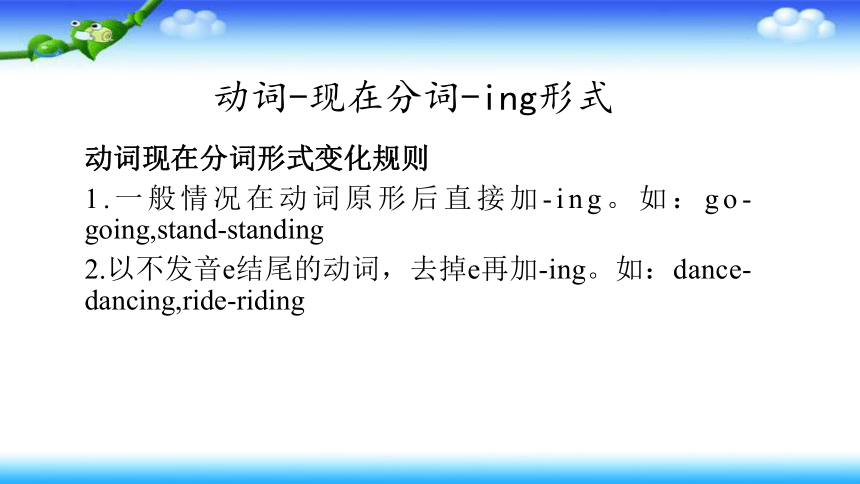

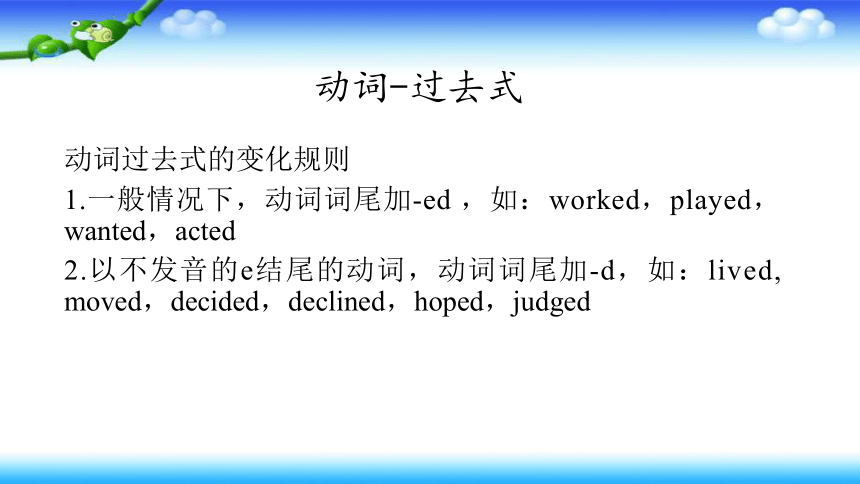
文档简介
目标
动词
目录
一、动词分类
二、情态动词用法详解
三、be动词用法及练习
四、助动词
五、综合训练
回目录页
动词-三单形式
动词第三人称单数
在一般现在时中,当主语是第三人称单数时,谓语动词要用第三人称单数形式,即常在动词原形后加-s或-es
动词第三人称单数变化有以下形式:
1.一般动词在词尾直接加-s,-s在清辅音之后读/s/,在浊辅音或元音后读/z/,ds读/dz/,ts读/ts/。如:help-helps/helps/,get-gets/gets/,read-reads/ri:dz/
2.以字母x、s、ch、sh或少数以o结尾的词加-es,es读/iz/。如:teach-teaches/ti:t?
iz/,
wash-washes/'w??iz/
3.以辅音字母加y结尾的动词,变y为i加es,-ies读/iz/。如:carry-carries/'k?riz/,fly-flies/flaiz/
注:在play-plays/pleiz/,say-says/sez/中,字母y前为元音字母,第三人称单数直接在y后加s即可。
4.以不发音e结尾的,直接加s,如果尾音是/s/或/z/,加s后字母“e”与“s”一起读作/iz/
5.特殊词例外。如:be-is/iz/,have-has/h?z/
动词-现在分词-ing形式
动词现在分词形式变化规则
1.一般情况在动词原形后直接加-ing。如:go-going,stand-standing
2.以不发音e结尾的动词,去掉e再加-ing。如:dance-dancing,ride-riding
3.以重读闭音节结尾的,末尾只有一个辅音字母的词,双写最后一个辅音字母再加-ing。如:swim-swimming,run-running,get-getting
4.少数几个以ie结尾的词,须将ie变为y再加ing。如:die-dying,lie-lying
动词-过去式
动词过去式的变化规则
1.一般情况下,动词词尾加-ed
,如:worked,played,wanted,acted
2.以不发音的e结尾的动词,动词词尾加-d,如:lived,
moved,decided,declined,hoped,judged
3.以辅音字母加y结尾的动词,把y变为i再加ed,如:
studied,tried,copied,cried,carried
4.以一个辅音字母结尾的重读闭音节动词,双写词尾辅音字母,再加-ed,如:stopped,begged,dropped,
planned
5.不规则动词的过去式变化规律性不强,须多加记忆。
go-went,make-made,get-got,buy-bought,come-came,
fly-flew,is/am-was,are-were,see-saw,bring-brought,
do-did,teach-taught,
think-thought,
say-said,sit-sat,
read-read,spend-spent,eat-ate,give-gave,sit-sat,
tell-told,write-wrote,feel-felt,find-found,
hear-heard,know-knew,put-put,grow-grew,take-took,catch-caught,come-came,become-became,swim-swam,
sweep-swept,sing-sang,draw-drew
不规则动词的过去式大体上归纳有以下六条记忆法:
①以t结尾的词,过去式与原形相同。如:put—put,
let—let,
cut—cut,
beat—beat
②以d结尾的词,把d变成t。如:build—built,
lend—lent,
send—sent,
spend—spent
③以n结尾的词,在词后加t。如:mean—meant,
burn—burnt,
learn—learnt
④以ow/aw结尾的词,把ow/aw变成ew。如:blow—blew,
draw—drew,
know—knew,
grow—grew
⑤含有双写字母的词,将双写改为单写,在词尾加t。如:keep—kept,
sleep—slept,
feel—felt,
smell—smelt
⑥含有元音字母o/i的词,将o/i变成a。如:sing—sang,
give—gave,
sit—sat,
drink—drank
回目录页
情态动词用法详解
回目录页
情
态
动
词
的
定
义
情态动词是一种本身有一定的词义,表示说话人的情绪、态度或语气的动词,但不能单独作谓语,只能和其他动词原形构成谓语。
We
can
be
there
on
time
tomorrow.
May
I
have
your
name?
Shall
we
begin
now?
You
must
obey(遵守)
the
school
rules.
情态动词
否定式
缩略形式
can
/
could
may
/
might
must
shall
/
should
will
/
would
need
cannot
/
could
not
can’t
/
couldn’t
~
+
not
mayn’t
/
mightn't
~
+
not
mustn’t
~
+
not
shan’t
/
shouldn’t
~
+
not
won’t
/
wouldn’t
~
+
not
needn’t
情
态
动
词
的
位
置
情态动词在句中放在谓语动词之前,谓语动词前若有助动词,则在助动词之前,疑问句中,
情态动词放在主语之前。
I
can
see
e
here.
我能看见你,过来吧。
What
can
I
do
for
you?
你要什么?
情
态
动
词
的
特
点
情态动词无人称和数的变化,情态动词后面跟的动词需用原形,否定式构成是在情态动词后面加“not”。个别情态动词有现在式和过去式两种形式,过去式可以用来表达更加客气、委婉的语气,时态性不强,可用于过去,现在或将来。
He
could
be
here
soon.
他很快就来。
-We
can't
carry
the
heavy
box.
-I'm
sorry
I
can't
help
you.
—我们搬不动这个重箱子。—对不起,我帮不上你。
情
态
动
词
的
用
法
表能力
(can,
could,
be
able
to,
were
/
was
able
to,
)
1.
表现在的或一般的能力:表示现在的或一般的能力用can
或
be
able
to.
一般的能力是指你无论什么时候做什么事情就能做到的能力。表示现在的能力或一般的能力时,can比be
able
to
更普遍。
表能力
:表现在的或一般的能力,表示现在的或一般的能力用can
或
be
able
to。
一般的能力是指你无论什么时候做什么事情就能做到的能力。表示现在的能力或一般的能力时,can比be
able
to
更普遍。
A
computer
can’t
think
for
itself,you
must
tell
it
what
to
do.
(表示一般的能力)
I
am
hungry.
I
can
eat
two
bowls
of
rice
now.
(表示现在的能力)
2.
表示将来的能力
表示将来的能力用
will
be
able
to
If
you
have
a
good
sleep,
you
will
be
able
to
work
out
this
problem.
3.
表示过去的能力
(1)could
,
was/
were
able
to
表示过去一般的能力,即不表示做与未做某事。
She
could
/
was
able
to
sing
like
an
angel
when
she
was
a
child.
3.
表示过去的能力
(1)could
,
was/
were
able
to
表示过去一般的能力,即不表示做与未做某事。
She
could
/
was
able
to
sing
like
an
angel
when
she
was
a
child.
(2)
was/
were
able
to
表示过去有能力并且成功地做了某事.
The
fire
spread
through(蔓延)
the
hotel
very
quickly
but
everyone
was
able
to
get
out.
(过去有能力并成功地做了某事)
情态动词其它用法要点
cannot
but
+
do
sth.
表示“不得不,只好”。如:
I
could
not
but
choose
to
go.
我只好去。
2.
May
well
和
may
as
well
结构
“may
well”意为
“完全能,很可能”,相当于
to
be
very
likely
to.如:
He
may
well
not
recognize
her
because
she
has
changed
a
lot.
情态动词其它用法要点
2.
may
well
和
may
as
well
结构
“may
well”意为
“完全能,很可能”,相当于
to
be
very
likely
to。如:
He
may
well
not
recognize
her
because
she
has
changed
a
lot.
“may
as
well
+
动词原形”意为“最好,倒不如”,相当于
had
better
,
如:
You
may
as
well
do
it
at
once.
We
may
as
well
stay
where
we
are.
3.
must
作“偏要、硬要”做某事。如:
-How
old
are
you,
madam?
-If
you
must
know,
I’m
twice
my
son’s
age.
情态动词其它用法要点
4.
may
作“可以”讲时,其否定式常用mustn’t表示“被禁止”;must
作“必须”讲时,其否定形式是
“needn’t”,
表示
“不必”。
—
May
I
use
your
car?
—
No,
you
mustn’t.
(委婉的拒绝可以用:
Sorry,
I
am
suing
it
now.
或
You’d
better
not等)
may
(might)
“可以”,表示说话人同意,许可或请求对方许可。
You
may
take
the
book
home.
你可以把书带回家去。
May
I
come
in?
我可以进来吗?
May
I
use
your
dictionary?
我可以用你的词典吗?
You
may
put
on
more
clothes.
你可以多穿点衣服。
He
said
he
might
lend
us
some
money.
他说他可以借给我们一些钱。
5.
must
“必须;应该;一定;准是”,表示说话人认为有必要做某事,命令、要求别人做某事以及对事物的推测。must
用来指一般现在时和一般将来时,
过去式可用
have
to
的过去式代替。
I
must
finish
my
work
today.
我今天必须完成我的工作。
You
mustn't
work
all
the
time.
你不能老是工作。
Must
I
return
the
book
tomorrow?
我必须明天还书吗?
After
such
a
long
walk,
you
must
be
tired.
走了这么长的路,
你一定累了。
He
must
be
the
man
I
am
looking
for.
他一定是我要找的人。
He
had
to
go
because
of
somebody’s
calling
him
that
day.
那天他要走,因为有人叫他。
1.need
“需要”,多用在否定式或疑问句中。
Need
I
attend
the
meeting
tomorrow?
我需要明天参加会议吗?
You
need
not
hand
in
the
paper
this
week.
这一周你不必交论文。
值得注意的是:
2.need
是一个情态动词,他的用法完全和其他情态动词一样,但
need
还可当作实义动词使用,这时
need
就像其他动词一样,有第三人称,单复数,
后面加带
to
的动词等特性。
I
need
a
bike
to
go
to
school.
我上学需要一辆自行车。
Do
you
need
a
dictionary?
你需要词典吗?
She
needs
a
necklace.
她需要一条项链。
3.
will
(would)
表决心、愿望。
would
为
will
的过去式,
可用于各人称。
I'll
do
my
best
to
catch
up
with
them.
我要尽全力赶上他们。
I'll
never
do
it
again,
that's
the
last
time.
我再不会做那件事情了,这是最后一次。
He
said
he
would
help
me.
他说他会帮助我。
will,
would用于疑问句表示说话人向对方提出请求或询问,用
would
比
will
更婉转,客气。
It's
hot.
Will
you
open
the
windows?
天气太热了,你能打开窗户吗?
Will
you
help
me
to
work
it
out?
你能帮我解这道题吗?
Would
you
like
some
coffee?
给你来点咖啡怎样?
4.
shall,
should
表示命令,
警告,
允诺,
征求,
劝告,
建议,
惊奇。
You
should
hand
in
the
exercise
book.
你应该交作业本了。
This
should
be
no
problem.
这应该没问题。
Shall
we
go
now?
我们现在可以走了吗?
Why
should
I
meet
him?
为什么我要见他?
回目录页
be动词的用法
回目录页
am
is
are
一般现在时
be动词的种类
be动词包括“am”,
“is”,
“are”三种形式。
第一人称单数(I)配合am来用。
句型解析析:I
am+…
I
am
smart
.
I
am
ten
years
old.
I
am
a
student.
I
am
a
boy..
be动词的种类
第二人称(You)配合are使用。
句型解析:You
are+…
You
are
my
good
friend.
You
are
a
good
person.
You
are
beautiful.
be动词的种类
第三人称单数(He
or
She
or
It)配合is使用。
句型解析:She(He,
It)
is
+……
She
is
a
good
girl.
She
is
so
cute.
She
is
a
teacher.
be动词的种类
人称复数
(we
/you/they)配合are使用。
句型解析:We
(You,
They)
are
+…
We
are
in
Class
5,Grade
7.
They
are
my
friends.
You
are
good
students.
连系动词be是am,
is,
are三者的原形,一般不直接出现在句子中,而是以am,
is,
are的形式出现。因此建议用歌谣熟记be动词的用法:
我(I)用am,
你(you)用are,
is连着他(he)、她(she)、它(it);
单数is复数are,学好英语就靠它。
变疑问,往前提,句末问号莫丢弃。
变否定,更容易,be后not莫忘记。
疑问否定任你变,句首大写莫迟疑。
be动词的用法
be
动词练习题
回目录页
用am,
is,
are填空。
1.
Who
______they?
2.
I_______
John
Brown.
3.
What_______
his
name,
Peter?
4.
You
________
Tom.
5.
Maria
and
Jane
______from
Class
1.
6.
Her
name
________Kate.
7.
It
______my
English
book.
are
am
is
are
are
is
is
He
is
Li
Ming.
Is
he
Li
Ming?
She
is
from
Canada.
一般疑问句
be到前面去。
含有be动词的一般疑问句:
他是李明。
他是李明吗?
她来自加拿大。
她来自加拿大吗?
Is
she
from
Canada?
一、
I
am
Li
Ming.
____
____Li
Ming?
注意:一般疑问句的第一人称需变成第二人称。
一般疑问句:
我是李明。
你是李明吗?
Are
you
回答:Yes,I
am.
/
No,
I'm
not.
二、含有be动词的肯定句变一般疑问句
1.
1)
I
am
a
student.
-
_____
_____a
student?
2)
They
are
blue.
_____
_____blue?
3)
He
is
Kangkang.
_____
_____Kangkang?
句子中有be,把be提到句首
Are
you
Are
they
Is
he
1
2.填空
2
3.句型转换
3
1.选择题
1.-How
are
you?
-
_________
A.
How
are
you?
B.
Fine,
thanks.And
you?
C.
Yes,
I
am.
2.
-
Are
you
Lily?
-__________
A.
Yes,
I’m.
B.
No,
I’m
not.
C.
Yes,
I’m
not.
选择题一
B
B
(
)1.
—Where
____
they
from?
—They’re
from
China.
is
B.
am
C.
are
(
)2.
—Is
she
Maria?
—No,
she
____.
A.
is
B.
isn’t
C.
aren’t
(
)3.
—Are
they
from
Canada?
—No,
they
____.
A.
are
B.
aren’t
C.
isn’t
(
)4.
—Is
he
Li
Ping?
—Yes,
____.
A.
I’m
B.
he’s
C.
he
is
选择题二
(
)5.
—____
you
Mingming?
—Yes,
I
____.
A.
Are;
are
B.
Am;
am
C.
Are;
am
(
)6.
Mary
____
from
Cuba.
A.is
B.
am
C.
are
(
)7.
Her
hair
____
black
and
long.
A.
has
B.
am
C.
is
(
)8.
—What
color
____
her
shoes?
—Black.
am
B.
is
C.
are
D.
be
(
)9.
These
are
my
pants.
His
____
yellow.
A.
is
B.
am
C.
are
D.
/
(
)10.
My
family
____
very
big.
A.
am
B.
is
C.
are
D.
does
(
)11.
This
pair
of
shoes
____
mine.
His
are
over
there.
A.
will
be
B.
is
C.
are
D.
be
(
)12.
My
name
____
Jack.
Liu
Ying
and
Sun
Mei
____
my
friends.
A.
is;
are
B.
is;
is
C.
are;
is
D.
is;
am
(
)13.
James
is
an
English
boy.
He
_____
from
England.
A.
come
B.
isn’t
C.
comes
D.
aren’t
(
)14.
—What
class
____
your
brother
in?
—He
____
in
Class
Two.
A.
does;
is
B.
is;
is
C.
are;
/
D.
are;
is
二、用am/
is/
are填空
1.He
_____my
good
friend,Jack.
2.
_____
you
Lily?
No,
I
am
Lucy.
3.I
____
Jane.
_____
you
Tang
Fang?
4.How
____
you?
Fine,
Thank
you.
is
Are
am
Are
are
5._____I??a?teacher?in?a?middle?school?
6._____you?a?worker?or?a?student?
7.She_____Lily's?sister.
8.______??the?student?from?America?
9.These?books_______?mine(我的).
10.?They____?Mary's(Mary的).?
用be动词(am,
is,
are)填空
Am
Are
is
Is
aren’t
are
11.
This
__________
my
teacher.
12.
How
__________
you?
13.
__________
she
your
mother?
14.
__________
your
mother
fine?
15.
—
How
__________
he?
—
He
__________
fine.
16.
—
__________
you
Kitty?
—
No,
I
__________
not.
I
__________
Millie.
17.
My
name
__________
Simon.
What
__________
your
name?
is
are
Is
Is
is
is
Are
am
am
is
is
用be动词(am,
is,
are)填空
18.
—
__________
they
from
Japan?
—
Yes,
they
__________.
19.
You
__________
a
teacher
and
I
__________
a
doctor.
20.
—
__________
Daniel
from
Nanjing?
—
Yes,
he
__________.
21.
—
Who
__________
this?
—
This
__________
Kangkang.
22.
—
__________
you
a
student?
—
Yes,
I
__________.
23.
—
Where
__________
Beijing?
—
It__________
in
China.
Are
are
are
am
Is
is
is
is
Are
am
is
is
用be动词(am,
is,
are)填空
24.
My
mother
__________
a
teacher.
25.
Your
sister
_________
ten
years
old.
26.
His
students
_________
all
in
the
classroom.
27.
You
and
I
_______
good
friends.
28.
I
_______
from
Guangdong.
29.
Lucy
_____
an
English
girl.
30.
She
_____
in
Class
Two
this
year.
31.
You
_____
our
Chinese
teacher
this
term.
is
is
are
are
am
is
is
are
用be动词(am,
is,
are)填空
三、句型转换(一)
1.
1)
I
am
a
boy.
-
_____
_____a
boy?
2)
They
are
black.
_____
_____black?
3)
He
is
Xiao
Ming.
_____
_____Xiao
Ming?
肯定句变一般疑问句
Are
you
Are
they
Is
he
三、句型转换(二)
把下列句子改为一般疑问句:
1.I
am
twenty-nine.
2.I
am
in
Class
Five,Grade
Seven.
3.We
are
from
Beijing.
4.Her
father
and
her
mother
are
teachers.
Are
you
twenty-nine?
Are
you
in
Class
Five,
Grade
Seven?
Are
you
from
Beijing?
Are
her
father
and
her
mother
teachers?
把下列句子改为否定句:
1.I
am
twenty-nine.
2.I
am
in
Class
Five,Grade
Seven.
3.We
are
from
Beijing.
4.Her
father
and
her
mother
are
teachers.
I
am
not
twenty-nine.
We
are
not
from
Beijing.
I
am
not
in
Class
Five,
Grade
Seven.
Her
father
and
her
mother
aren't
teachers.
be动词的否定句:
be动词后加not
助动词
回目录页
什么是助动词?
协助主要动词构成谓语动词词组的词叫助
动词(Auxiliary
Verb)。被协助的动词称作主要动词(Main
Verb)。
助动词自身没有词义,不可单独使用。如:
He
doesn't
like
English.他不喜欢英语。
(doesn't是助动词,无词义;like是主要动词,有词义)
助动词分为:基本助动词,情态助动词,半助动词。
基本助动词:be,do,have
情态助动词:shall,
will,
should,
would,could
分类及简介
一、基本助动词
助动词be的用法:
be
+现在分词,构成进行时态。如:
They
are
having
a
meeting.
English
is
becoming
more
and
more
important.
be
+
动词不定式,可表示最近、未来的计划或安排。如:
He
is
to
go
to
New
York
next
week.
We
are
to
teach
the
fresh
persons.
助动词do
的用法:
构成一般疑问句。如:
Do
you
want
to
pass
the
English
test?
do
+
not
构成否定句。如:
He
doesn't
like
to
study.
In
the
past,
many
students
did
not
know
the
importance
of
English.
构成否定祈使句。如:
Don't
be
so
lazy.
说明:构成否定祈使句只用do,不用did和does。
用作代动词,例如:
—
Do
you
like
Beijing?
—
Yes,
I
do.
(do用作代动词,代替like
Beijing.)
He
knows
how
to
drive
a
car,
doesn't
he?
他知道如何开车,对吧?
二、情态助动词
can/could
指主观能力。
can指现在和将来。指过去的能力一般用was/were
able
to
How
long
can
you
hold
your
breath
under
water?
That
is
easy.I
can
do
that
tomorrow.
表可能。can
表可能时常用于疑问句和否定句,指某事是否事实。
Can
it
be
true?
We
can’t
change
a
law.
He
said
he
couldn’t
agree
more.
表允许用于非正式场合。
can在肯定疑问句中表要求,在否定句中表禁止。
You
can
smoke
in
the
entrance
hall.
Can
you
lend
me
2
yuan?
could
表示要求时只用于疑问句,语气更加委婉。
Could
you
please
fetch
us
a
few
cups?
表感彩。表某种情绪。
What
can
satisfy
her?(不满)
What
else
can
you
say?(不耐烦)
How
can
I
do
such
a
thing
?(难办)
注意
can与could
的区别与联系
could是can的过去式,除去can的各种功能外,还用来表示语气委婉。
can和could还可以表示某人或某物一时的特点指“有可能有时会”。
It
can
be
very
misty
in
this
area.
这里有时会大雾弥漫。
He
could
be
very
proud.
他有时会很骄傲。
2、may与might
(1)表示可以做或可能发生的事
He
may
come
soon.
You
may
order
a
taxi
by
telephone.
might用于间接引语;也表示客观未实现的动作
He
said
he
might
order
a
taxi
by
telephone.他说他可以用电话定出租车。
He
might
have
fallen
ill
if
he
hadn’t
take
the
medicine.他如果没服药可能就病倒了
2、may与might
You
may
take
the
book
home。
你可以把这本书带回家。
May
I
borrow
your
bicycle?
我可以借你的自行车吗?
Might
I
have
a
little
brandy?
我可以喝一点白兰地吗?
(2)may表允许,多用于肯定句和疑问句,正式场合,might
表允许时比may更有礼貌。
表祝愿通常用may,此时句子用倒装语序。
May
our
friendship
live
long.
Happy
may
your
birthday
be
.
May
god
bless
you
.
might可用于虚拟语气
If
you
didn’t
mind
,I
might
go
there.
如果你不反对的话,我可能就去那里。
Why
on
earth
didn’t
he
send
to
say
that
he
was
ill?We
might
have
helped
him.
究竟为什么他不捎信来说他生病了?我们本可以帮助他的。
2.may
和
can
may较正式,而can口语化。
May
(might)
I
speak
to
you
for
a
moment,
professor?
Can(could)
I
have
a
cup
of
tea,mom?
could
有时也可表示推测,因此三者可以互换。
He
may/might/could
be
at
the
conference.
may
not
表示不可能时,重音落在may上。
may
not表示不许可时,重音落在否定词上。因此在书面语中,为防止歧义,表示不可能用can't
3
will/would
1.will
/would
表请求,指将来,用于疑问句。此时would更委婉。
would
you
mind
closing
he
door?
Will
you
give
her
the
letter?
2.will
/would
表习惯反复动作,用于肯定句。
You
will
have
your
own
way.
你总是想怎样就怎样。
3
will/would
will
/would
表料想推测,指没现在或将来,用于二三人称。可用进行时指现在,完成式指过去。
Hurry
up
.
They
will
be
waiting
.
快点,他们一定在等我们。
He
will
have
got
home
by
now.
他该到家了。
推测程度由高到低为
must—will—would—ought
to—should—can—could—may—might
will
/would
表意愿,用于第一人称。will指将来,would用于间接引语指过去的将来
I
won’t
argue
with
you
.
I
said
I
would
do
anything
for
him
.
will
/would
用于非人称主语,表示固有的性质倾向,通常用于否定句。
The
window
won’t
open.窗户打不开。
The
door
won’t
shut.门关不上
will/
would
表拒绝用于否定句即won’t
I
won’t
marry
a
man
I
don’t
love.
I
won’t
listen
to
your
nonsenses
.
would
用于虚拟语气
I
wish
the
rain
would
stop
for
a
moment.
You
would
answer
much
better
if
you
were
more
attentive.
注意:比较would与used
to
二者均可表示习惯
不同之处在于,used
to有现在已无此习惯的意思,并可表示一次性动作。
I
don’t
swim
so
often
as
I
used
to.
我不像过去那样常游泳了。
shall的用法
Shall除在一般将来时中用于第一人称外,还有以下用法:
表义务,用于第二三人称。如:
You
shall
do
as
you
see
me
do.
你照我做的样子做。
He
shall
be
punished
if
he
breaks
the
rule.
如果他不服从就要受到处罚。
4.shall与should
a.在当代英语中,shall多用于正式法律文字。如:
This
law
shall
have
effect
in
Scotland.这部法律将
影响苏格兰。
b.表许诺,用于第二三人称的肯定句和否定句。如:
1.you
shall
have
my
answer
tomorrow?
你明天可以得到我的答复。
2.she
shall
get
her
share.
我可以得到她的一份。
c.表征询意见,用于第一三人称的疑问句。如:
1.What
shall
he
do
next?
下一步他要干什么呢?
2.Let’s
start
tomorrow,
shall
we?
我们明天动身,好吗?
I'm
sorry
that
you
should
think
so
badly
of
me.
你竟把我想得这样坏,我感到遗憾。
Three
weeks
should
suffice.
三个星期可能足够了。
7.用于虚拟语气,表推测,暗含很大的可能。如:
I
suggest
that
you
should
stay
here
as
if
nothing
had
happened.
我建议你待在这儿,就好像什么事也没有发生。
must
的用法
1.
must表义务,后跟不定式一般式,可用于肯定句和疑问句。如:
Children
must
form
a
good
habit
in
their
everyday
life.
儿童必须在他们的日常生活中养成良好的习惯。
Must
he
do
it
himself?
他必须亲自做那件事吗?
2.
must的否定形式表不许,后跟不定式一般式。如:
Journalists
must
not
make
mistakes
in
their
newspaper
reports.
记者不允许在新闻报道中出错。
3.
must表推测,暗含很大的可能,只用于肯定句。如:
(1)I
don’t
understand
what
they
are
saying.
They
must
be
foreign.我听不懂他们在说什么。他们一定是外国来的。
(2)Let’s
have
something
to
eat.
You
must
be
starving.
我们吃些东西吧。你一定饿了。
need
的用法
用作情态助动词时,它只有一种形式,没有人称和数的变化,后跟不带to的不定式,主要用于否定句和疑问句。否定式为needn’t.
助动词dare
实义动词dare
否定式
dare
not
don’t(doesn’t,
didn’t)dare
过去式
Dare/
dared?
dared
used
to的用法
1.情态动词used
to
只有一种形式,它后跟不定式一般式,可以表过去存在的习惯或状态。如:
(1)
In
the
past,
people
used
to
offer
friends
cigarettes
when
they
met.过去,人们见面时经常给朋友递烟。
(2)
Nowadays
he
gives
fewer
concerts
than
he
used
to.如今他举办音乐会比从前少了。
2.
used
to
的否定结构却有两种形式。如:
(1)
He
used
not
to
/usedn’t
to
smoke.他过去不吸烟。
(2)
He
didn’t
use
to
smoke.他过去不吸烟。
3.
used
to
的疑问结构常用do
的形式。如:
(1)
Did
he
use
to
smoke?他过去吸烟吗?
(2)
He
used
to
smoke,
didn’t
he?他过去吸烟,对吗?
be
used
to
结构和情态动词used
to
的区别:
1.
在be
used
to
结构中,be
是连系动词,used
是形容词,to
是介词,因此只后跟名词短语或动名词。如:
Heavy
smokers
cannot
stop
smoking
because
they
are
used
to
nicotine.
吸烟多的人不能不吸烟,因为他们对尼古丁已经上瘾了。
情态动词used
to
前面没有be
,后跟不带to
的动词不定式。如:
I
used
to
get
along
very
well
with
my
cousin
and
we
used
to
be
very
good
friends.
我过去同我的表弟相处得很好,我们曾经是好朋友。
注意:
半助动词
半助动词后的主动词用不带to的不定式。可以是一般形式也可以是进行体或完成体。
(1)Why
are
you
driving
so
fast
in
this
area?you
are
supposed
to
know
the
speed
limit.
(2)Mother
is
still
not
quiet
well.
She
is
not
supposed
to
be
working
so
hard.
半助动词后的主动词用不带to的不定式。可以是一般形式也可以是进行式或完成式。
(1)Why
are
you
driving
so
fast
in
this
area?you
are
supposed
to
know
the
speed
limit.
(2)Mother
is
still
not
quiet
well.
She
is
not
supposed
to
be
working
so
hard.
助动词的缩略形式
英语中有以下24个助动词有缩略形式。其中23个有否定缩略形式,10个有肯定缩略形式。
助动词
否定缩略
肯定缩略
am
无
’m
is
isn’t
’s
are
aren’t
’re
was
wasn’t
无
were
weren’t
无
have
haven’t
’ve
has
hasn’t
’s
had
hadn’t
’d
do
don’t
-
does
doesn’t
-
did
didn’t
-
shall
shan’t
’ll
should
shouldn’t
’d
will
won’t
’ll
would
wouldn’t
’d
can
can’t
-
could
couldn’t
-
may
mayn’t
-
might
mightn’t
-
must
mustn’t
-
need
needn’t
-
dare
daren’t
-
used(to)
usedn’t
-
注意:
1.
I
am
not
的疑问形式需用
aren’t
(I)替代,如:
I’m
late
,
aren’t
I?
2.否定疑问句既能用否定缩略形式,也能用非缩略形式。试比较:
综合训练
回目录页
一、从方框中选择合适的动词填空。(每词限用一次)
draw,
clean,
see,
take,
make,
go,
speak,
climb,
play,
ride
1._______
a
doctor
2._______
the
room
3._____
pictures
4._____
a
bike
5._____
cartoons
6._____
mountains
7.___
for
a
walk
8._______
English
9.______
a
snowman
10._____
sports
see
clean
take
ride
draw
climb
go
speak
make
play
三、根据句意及汉语提示完成单词。
1.Jane
can
_________(跳舞)
for
the
party.
2.In
winter,I
like
to
________(睡觉).
3.Look!The
rabbit
is
__________(跳).
4.Let's
go
straight
and
_______(转弯)
left
at
the
bookstore.
5.You
should
take
a
deep
breath
and
__________(数数)
to
ten.
dance
sleep
jumping
turn
count
1.She
wants
to
_____
the
new
film
magazine.
2.We
didn't
_______
the
food
yesterday
evening.
3.I
often
_______
at
home
with
my
grandma
on
the
weekend.
4.We
will
______
a
picnic
next
Sunday.
5.I
_________
class
at
3
o'clock.
buy
cook
stay
have
finish
五、单项选择。
( )1.The
dress
is
very
nice.I'll
________
it.
A.find
B.try
C.take
( )2.Can
you
________
me
the
way
to
her
house?
A.give
B.know
C.show
( )3.My
sister
Alice
can
________
English
very
well.
A.speak
B.tell
C.say
( )4.I
can
________
with
my
mouth.
A.hear
B.smell
C.eat
( )5.The
shoes
in
the
window
are
nice!Let's
have
a
________.
A.see
B.look
C.watch
( )6.Look!The
light
is
green.Let's
________
now.
A.stop
and
wait
B.go
C.slow
down
C
C
A
C
B
B
六、根据汉语意思完成下列句子。
1.我会唱英文歌曲。
I
can
_____
______
_____.
2.我们要去看一部关于太空旅行的电影。
I'm
going
to
______
______
_______
about
space
travel.
3.让我们一起去野餐吧!
Let's______
______
______
______
!
4.我通常在晚上6点钟吃晚餐。
I
usually
______
______
at
6
o'clock
in
the
evening.
5.你能帮助你妈妈洗衣服吗?
Can
you
help
your
mother
______
the______?
sing
English
songs
see
a
movie
go
on
a
picnic
have
supper
wash
clothes
一、写出下列系动词、助动词、情态动词的否定形式的缩写形式。
1.is _____
2.are ______
3.was _______
4.will ______
5.must ______
6.were ________
7.did ______
8.can ______
9.do ______
二、选用do、does或did填空。
1.When
____
you
get
up
every
day?
2.What
____
American
people
do
at
Christmas?
3.Where
_____
your
brother
go
yesterday
afternoon?
4.How
______
your
sister
go
to
school
every
day?
5.
______
your
father
like
reading
newspapers?
isn't
aren't
wasn't
won't
mustn't
weren't
didn't
can't
don't
do
do
did
does
Does
三、用be动词的适当形式填空。
1.—Where
_____
you
yesterday? —I
____
at
home.
2.—How
old
____
you? —I
____
twelve
years
old.
3.Tomorrow
will
___
a
sunny
day.
4.My
grandpa
___
watching
TV
in
the
living
room.
5.Look!John
and
Mike
______
playing
football
on
the
playground.
6.There
____
a
computer
and
some
CDs
on
the
desk.
were
was
are
am
be
is
are
is
1._____
your
friend
speak
English,too?
2.You
_____,or
you
won't
pass
the
exam.
3.John
_____
go
and
see
his
grandparents
next
week.But
I'm
not
sure.
4._____
you
give
me
a
glass
of
water?
5.It's
very
cloudy
outside.It
_____
rain
soon.
Can
must
will
Could
may
五、单项选择。
( )1.Amy
and
Sarah
________
doing
their
homework.
A.is
B.are
C.be
( )2.When
________
your
mother
often
________
housework?
A.does;do
B.do;do
C.does;does
( )3.My
cousin
________
draw
pictures
before.
A.can't
B.couldn't
C.don't
( )4.—________
you
like
a
glass
of
milk?
—Yes,please.
A.May
B.Could
C.Would
B
A
B
C
( )5.There
________
two
pencils
and
a
pen
in
the
box.
A.are
B.is
C.has
( )6.—Is
your
father
from
Beijing?
—________.
A.Yes,he
is
B.Yes,he
does
C.No,he
doesn't
( )7.That
________
like
a
lot
of
fun.
A.sounds
B.looks
C.listens
( )8.—May
I
________
your
bike?
—Sure.
A.ride
B.riding
C.rode
A
A
A
A
( )9.—________
Fred
like
football?
—Yes,he
________.
A.Does;does
B.Do;does
C.Does;do
( )10.There
________
some
milk
and
two
apples
on
the
table.
A.were
B.are
C.is
( )11.—________
we
go
to
the
supermarket?
—OK.
A.Have
B.Shall
C.Should
( )12.—________
you
go
to
the
zoo?
—No,I
went
to
the
park.
A.Did
B.Do
C.Were
A
C
B
A
A
Does
D
I
am
not
A
was
C
be
B
doesn't
七、按要求完成下列句子。
1.This
isn't
my
grandmother.(改为肯定句)
This
___
my
grandmother.
2.He
has
a
new
schoolbag.(改为否定句)
He
________
_______
a
new
schoolbag.
3.I
like
green
tea
and
orange
juice.(改为否定句)
I
_______
like
green
tea
___
orange
juice.
4.My
name
is
Alice.(改为同义句)
I
___
Alice.
5.I
don't
have
any
money.(改为肯定句)
I
_____
_____
money.
is
doesn't
have
don't
or
am
have
some
回目录页
动词
目录
一、动词分类
二、情态动词用法详解
三、be动词用法及练习
四、助动词
五、综合训练
回目录页
动词-三单形式
动词第三人称单数
在一般现在时中,当主语是第三人称单数时,谓语动词要用第三人称单数形式,即常在动词原形后加-s或-es
动词第三人称单数变化有以下形式:
1.一般动词在词尾直接加-s,-s在清辅音之后读/s/,在浊辅音或元音后读/z/,ds读/dz/,ts读/ts/。如:help-helps/helps/,get-gets/gets/,read-reads/ri:dz/
2.以字母x、s、ch、sh或少数以o结尾的词加-es,es读/iz/。如:teach-teaches/ti:t?
iz/,
wash-washes/'w??iz/
3.以辅音字母加y结尾的动词,变y为i加es,-ies读/iz/。如:carry-carries/'k?riz/,fly-flies/flaiz/
注:在play-plays/pleiz/,say-says/sez/中,字母y前为元音字母,第三人称单数直接在y后加s即可。
4.以不发音e结尾的,直接加s,如果尾音是/s/或/z/,加s后字母“e”与“s”一起读作/iz/
5.特殊词例外。如:be-is/iz/,have-has/h?z/
动词-现在分词-ing形式
动词现在分词形式变化规则
1.一般情况在动词原形后直接加-ing。如:go-going,stand-standing
2.以不发音e结尾的动词,去掉e再加-ing。如:dance-dancing,ride-riding
3.以重读闭音节结尾的,末尾只有一个辅音字母的词,双写最后一个辅音字母再加-ing。如:swim-swimming,run-running,get-getting
4.少数几个以ie结尾的词,须将ie变为y再加ing。如:die-dying,lie-lying
动词-过去式
动词过去式的变化规则
1.一般情况下,动词词尾加-ed
,如:worked,played,wanted,acted
2.以不发音的e结尾的动词,动词词尾加-d,如:lived,
moved,decided,declined,hoped,judged
3.以辅音字母加y结尾的动词,把y变为i再加ed,如:
studied,tried,copied,cried,carried
4.以一个辅音字母结尾的重读闭音节动词,双写词尾辅音字母,再加-ed,如:stopped,begged,dropped,
planned
5.不规则动词的过去式变化规律性不强,须多加记忆。
go-went,make-made,get-got,buy-bought,come-came,
fly-flew,is/am-was,are-were,see-saw,bring-brought,
do-did,teach-taught,
think-thought,
say-said,sit-sat,
read-read,spend-spent,eat-ate,give-gave,sit-sat,
tell-told,write-wrote,feel-felt,find-found,
hear-heard,know-knew,put-put,grow-grew,take-took,catch-caught,come-came,become-became,swim-swam,
sweep-swept,sing-sang,draw-drew
不规则动词的过去式大体上归纳有以下六条记忆法:
①以t结尾的词,过去式与原形相同。如:put—put,
let—let,
cut—cut,
beat—beat
②以d结尾的词,把d变成t。如:build—built,
lend—lent,
send—sent,
spend—spent
③以n结尾的词,在词后加t。如:mean—meant,
burn—burnt,
learn—learnt
④以ow/aw结尾的词,把ow/aw变成ew。如:blow—blew,
draw—drew,
know—knew,
grow—grew
⑤含有双写字母的词,将双写改为单写,在词尾加t。如:keep—kept,
sleep—slept,
feel—felt,
smell—smelt
⑥含有元音字母o/i的词,将o/i变成a。如:sing—sang,
give—gave,
sit—sat,
drink—drank
回目录页
情态动词用法详解
回目录页
情
态
动
词
的
定
义
情态动词是一种本身有一定的词义,表示说话人的情绪、态度或语气的动词,但不能单独作谓语,只能和其他动词原形构成谓语。
We
can
be
there
on
time
tomorrow.
May
I
have
your
name?
Shall
we
begin
now?
You
must
obey(遵守)
the
school
rules.
情态动词
否定式
缩略形式
can
/
could
may
/
might
must
shall
/
should
will
/
would
need
cannot
/
could
not
can’t
/
couldn’t
~
+
not
mayn’t
/
mightn't
~
+
not
mustn’t
~
+
not
shan’t
/
shouldn’t
~
+
not
won’t
/
wouldn’t
~
+
not
needn’t
情
态
动
词
的
位
置
情态动词在句中放在谓语动词之前,谓语动词前若有助动词,则在助动词之前,疑问句中,
情态动词放在主语之前。
I
can
see
e
here.
我能看见你,过来吧。
What
can
I
do
for
you?
你要什么?
情
态
动
词
的
特
点
情态动词无人称和数的变化,情态动词后面跟的动词需用原形,否定式构成是在情态动词后面加“not”。个别情态动词有现在式和过去式两种形式,过去式可以用来表达更加客气、委婉的语气,时态性不强,可用于过去,现在或将来。
He
could
be
here
soon.
他很快就来。
-We
can't
carry
the
heavy
box.
-I'm
sorry
I
can't
help
you.
—我们搬不动这个重箱子。—对不起,我帮不上你。
情
态
动
词
的
用
法
表能力
(can,
could,
be
able
to,
were
/
was
able
to,
)
1.
表现在的或一般的能力:表示现在的或一般的能力用can
或
be
able
to.
一般的能力是指你无论什么时候做什么事情就能做到的能力。表示现在的能力或一般的能力时,can比be
able
to
更普遍。
表能力
:表现在的或一般的能力,表示现在的或一般的能力用can
或
be
able
to。
一般的能力是指你无论什么时候做什么事情就能做到的能力。表示现在的能力或一般的能力时,can比be
able
to
更普遍。
A
computer
can’t
think
for
itself,you
must
tell
it
what
to
do.
(表示一般的能力)
I
am
hungry.
I
can
eat
two
bowls
of
rice
now.
(表示现在的能力)
2.
表示将来的能力
表示将来的能力用
will
be
able
to
If
you
have
a
good
sleep,
you
will
be
able
to
work
out
this
problem.
3.
表示过去的能力
(1)could
,
was/
were
able
to
表示过去一般的能力,即不表示做与未做某事。
She
could
/
was
able
to
sing
like
an
angel
when
she
was
a
child.
3.
表示过去的能力
(1)could
,
was/
were
able
to
表示过去一般的能力,即不表示做与未做某事。
She
could
/
was
able
to
sing
like
an
angel
when
she
was
a
child.
(2)
was/
were
able
to
表示过去有能力并且成功地做了某事.
The
fire
spread
through(蔓延)
the
hotel
very
quickly
but
everyone
was
able
to
get
out.
(过去有能力并成功地做了某事)
情态动词其它用法要点
cannot
but
+
do
sth.
表示“不得不,只好”。如:
I
could
not
but
choose
to
go.
我只好去。
2.
May
well
和
may
as
well
结构
“may
well”意为
“完全能,很可能”,相当于
to
be
very
likely
to.如:
He
may
well
not
recognize
her
because
she
has
changed
a
lot.
情态动词其它用法要点
2.
may
well
和
may
as
well
结构
“may
well”意为
“完全能,很可能”,相当于
to
be
very
likely
to。如:
He
may
well
not
recognize
her
because
she
has
changed
a
lot.
“may
as
well
+
动词原形”意为“最好,倒不如”,相当于
had
better
,
如:
You
may
as
well
do
it
at
once.
We
may
as
well
stay
where
we
are.
3.
must
作“偏要、硬要”做某事。如:
-How
old
are
you,
madam?
-If
you
must
know,
I’m
twice
my
son’s
age.
情态动词其它用法要点
4.
may
作“可以”讲时,其否定式常用mustn’t表示“被禁止”;must
作“必须”讲时,其否定形式是
“needn’t”,
表示
“不必”。
—
May
I
use
your
car?
—
No,
you
mustn’t.
(委婉的拒绝可以用:
Sorry,
I
am
suing
it
now.
或
You’d
better
not等)
may
(might)
“可以”,表示说话人同意,许可或请求对方许可。
You
may
take
the
book
home.
你可以把书带回家去。
May
I
come
in?
我可以进来吗?
May
I
use
your
dictionary?
我可以用你的词典吗?
You
may
put
on
more
clothes.
你可以多穿点衣服。
He
said
he
might
lend
us
some
money.
他说他可以借给我们一些钱。
5.
must
“必须;应该;一定;准是”,表示说话人认为有必要做某事,命令、要求别人做某事以及对事物的推测。must
用来指一般现在时和一般将来时,
过去式可用
have
to
的过去式代替。
I
must
finish
my
work
today.
我今天必须完成我的工作。
You
mustn't
work
all
the
time.
你不能老是工作。
Must
I
return
the
book
tomorrow?
我必须明天还书吗?
After
such
a
long
walk,
you
must
be
tired.
走了这么长的路,
你一定累了。
He
must
be
the
man
I
am
looking
for.
他一定是我要找的人。
He
had
to
go
because
of
somebody’s
calling
him
that
day.
那天他要走,因为有人叫他。
1.need
“需要”,多用在否定式或疑问句中。
Need
I
attend
the
meeting
tomorrow?
我需要明天参加会议吗?
You
need
not
hand
in
the
paper
this
week.
这一周你不必交论文。
值得注意的是:
2.need
是一个情态动词,他的用法完全和其他情态动词一样,但
need
还可当作实义动词使用,这时
need
就像其他动词一样,有第三人称,单复数,
后面加带
to
的动词等特性。
I
need
a
bike
to
go
to
school.
我上学需要一辆自行车。
Do
you
need
a
dictionary?
你需要词典吗?
She
needs
a
necklace.
她需要一条项链。
3.
will
(would)
表决心、愿望。
would
为
will
的过去式,
可用于各人称。
I'll
do
my
best
to
catch
up
with
them.
我要尽全力赶上他们。
I'll
never
do
it
again,
that's
the
last
time.
我再不会做那件事情了,这是最后一次。
He
said
he
would
help
me.
他说他会帮助我。
will,
would用于疑问句表示说话人向对方提出请求或询问,用
would
比
will
更婉转,客气。
It's
hot.
Will
you
open
the
windows?
天气太热了,你能打开窗户吗?
Will
you
help
me
to
work
it
out?
你能帮我解这道题吗?
Would
you
like
some
coffee?
给你来点咖啡怎样?
4.
shall,
should
表示命令,
警告,
允诺,
征求,
劝告,
建议,
惊奇。
You
should
hand
in
the
exercise
book.
你应该交作业本了。
This
should
be
no
problem.
这应该没问题。
Shall
we
go
now?
我们现在可以走了吗?
Why
should
I
meet
him?
为什么我要见他?
回目录页
be动词的用法
回目录页
am
is
are
一般现在时
be动词的种类
be动词包括“am”,
“is”,
“are”三种形式。
第一人称单数(I)配合am来用。
句型解析析:I
am+…
I
am
smart
.
I
am
ten
years
old.
I
am
a
student.
I
am
a
boy..
be动词的种类
第二人称(You)配合are使用。
句型解析:You
are+…
You
are
my
good
friend.
You
are
a
good
person.
You
are
beautiful.
be动词的种类
第三人称单数(He
or
She
or
It)配合is使用。
句型解析:She(He,
It)
is
+……
She
is
a
good
girl.
She
is
so
cute.
She
is
a
teacher.
be动词的种类
人称复数
(we
/you/they)配合are使用。
句型解析:We
(You,
They)
are
+…
We
are
in
Class
5,Grade
7.
They
are
my
friends.
You
are
good
students.
连系动词be是am,
is,
are三者的原形,一般不直接出现在句子中,而是以am,
is,
are的形式出现。因此建议用歌谣熟记be动词的用法:
我(I)用am,
你(you)用are,
is连着他(he)、她(she)、它(it);
单数is复数are,学好英语就靠它。
变疑问,往前提,句末问号莫丢弃。
变否定,更容易,be后not莫忘记。
疑问否定任你变,句首大写莫迟疑。
be动词的用法
be
动词练习题
回目录页
用am,
is,
are填空。
1.
Who
______they?
2.
I_______
John
Brown.
3.
What_______
his
name,
Peter?
4.
You
________
Tom.
5.
Maria
and
Jane
______from
Class
1.
6.
Her
name
________Kate.
7.
It
______my
English
book.
are
am
is
are
are
is
is
He
is
Li
Ming.
Is
he
Li
Ming?
She
is
from
Canada.
一般疑问句
be到前面去。
含有be动词的一般疑问句:
他是李明。
他是李明吗?
她来自加拿大。
她来自加拿大吗?
Is
she
from
Canada?
一、
I
am
Li
Ming.
____
____Li
Ming?
注意:一般疑问句的第一人称需变成第二人称。
一般疑问句:
我是李明。
你是李明吗?
Are
you
回答:Yes,I
am.
/
No,
I'm
not.
二、含有be动词的肯定句变一般疑问句
1.
1)
I
am
a
student.
-
_____
_____a
student?
2)
They
are
blue.
_____
_____blue?
3)
He
is
Kangkang.
_____
_____Kangkang?
句子中有be,把be提到句首
Are
you
Are
they
Is
he
1
2.填空
2
3.句型转换
3
1.选择题
1.-How
are
you?
-
_________
A.
How
are
you?
B.
Fine,
thanks.And
you?
C.
Yes,
I
am.
2.
-
Are
you
Lily?
-__________
A.
Yes,
I’m.
B.
No,
I’m
not.
C.
Yes,
I’m
not.
选择题一
B
B
(
)1.
—Where
____
they
from?
—They’re
from
China.
is
B.
am
C.
are
(
)2.
—Is
she
Maria?
—No,
she
____.
A.
is
B.
isn’t
C.
aren’t
(
)3.
—Are
they
from
Canada?
—No,
they
____.
A.
are
B.
aren’t
C.
isn’t
(
)4.
—Is
he
Li
Ping?
—Yes,
____.
A.
I’m
B.
he’s
C.
he
is
选择题二
(
)5.
—____
you
Mingming?
—Yes,
I
____.
A.
Are;
are
B.
Am;
am
C.
Are;
am
(
)6.
Mary
____
from
Cuba.
A.is
B.
am
C.
are
(
)7.
Her
hair
____
black
and
long.
A.
has
B.
am
C.
is
(
)8.
—What
color
____
her
shoes?
—Black.
am
B.
is
C.
are
D.
be
(
)9.
These
are
my
pants.
His
____
yellow.
A.
is
B.
am
C.
are
D.
/
(
)10.
My
family
____
very
big.
A.
am
B.
is
C.
are
D.
does
(
)11.
This
pair
of
shoes
____
mine.
His
are
over
there.
A.
will
be
B.
is
C.
are
D.
be
(
)12.
My
name
____
Jack.
Liu
Ying
and
Sun
Mei
____
my
friends.
A.
is;
are
B.
is;
is
C.
are;
is
D.
is;
am
(
)13.
James
is
an
English
boy.
He
_____
from
England.
A.
come
B.
isn’t
C.
comes
D.
aren’t
(
)14.
—What
class
____
your
brother
in?
—He
____
in
Class
Two.
A.
does;
is
B.
is;
is
C.
are;
/
D.
are;
is
二、用am/
is/
are填空
1.He
_____my
good
friend,Jack.
2.
_____
you
Lily?
No,
I
am
Lucy.
3.I
____
Jane.
_____
you
Tang
Fang?
4.How
____
you?
Fine,
Thank
you.
is
Are
am
Are
are
5._____I??a?teacher?in?a?middle?school?
6._____you?a?worker?or?a?student?
7.She_____Lily's?sister.
8.______??the?student?from?America?
9.These?books_______?mine(我的).
10.?They____?Mary's(Mary的).?
用be动词(am,
is,
are)填空
Am
Are
is
Is
aren’t
are
11.
This
__________
my
teacher.
12.
How
__________
you?
13.
__________
she
your
mother?
14.
__________
your
mother
fine?
15.
—
How
__________
he?
—
He
__________
fine.
16.
—
__________
you
Kitty?
—
No,
I
__________
not.
I
__________
Millie.
17.
My
name
__________
Simon.
What
__________
your
name?
is
are
Is
Is
is
is
Are
am
am
is
is
用be动词(am,
is,
are)填空
18.
—
__________
they
from
Japan?
—
Yes,
they
__________.
19.
You
__________
a
teacher
and
I
__________
a
doctor.
20.
—
__________
Daniel
from
Nanjing?
—
Yes,
he
__________.
21.
—
Who
__________
this?
—
This
__________
Kangkang.
22.
—
__________
you
a
student?
—
Yes,
I
__________.
23.
—
Where
__________
Beijing?
—
It__________
in
China.
Are
are
are
am
Is
is
is
is
Are
am
is
is
用be动词(am,
is,
are)填空
24.
My
mother
__________
a
teacher.
25.
Your
sister
_________
ten
years
old.
26.
His
students
_________
all
in
the
classroom.
27.
You
and
I
_______
good
friends.
28.
I
_______
from
Guangdong.
29.
Lucy
_____
an
English
girl.
30.
She
_____
in
Class
Two
this
year.
31.
You
_____
our
Chinese
teacher
this
term.
is
is
are
are
am
is
is
are
用be动词(am,
is,
are)填空
三、句型转换(一)
1.
1)
I
am
a
boy.
-
_____
_____a
boy?
2)
They
are
black.
_____
_____black?
3)
He
is
Xiao
Ming.
_____
_____Xiao
Ming?
肯定句变一般疑问句
Are
you
Are
they
Is
he
三、句型转换(二)
把下列句子改为一般疑问句:
1.I
am
twenty-nine.
2.I
am
in
Class
Five,Grade
Seven.
3.We
are
from
Beijing.
4.Her
father
and
her
mother
are
teachers.
Are
you
twenty-nine?
Are
you
in
Class
Five,
Grade
Seven?
Are
you
from
Beijing?
Are
her
father
and
her
mother
teachers?
把下列句子改为否定句:
1.I
am
twenty-nine.
2.I
am
in
Class
Five,Grade
Seven.
3.We
are
from
Beijing.
4.Her
father
and
her
mother
are
teachers.
I
am
not
twenty-nine.
We
are
not
from
Beijing.
I
am
not
in
Class
Five,
Grade
Seven.
Her
father
and
her
mother
aren't
teachers.
be动词的否定句:
be动词后加not
助动词
回目录页
什么是助动词?
协助主要动词构成谓语动词词组的词叫助
动词(Auxiliary
Verb)。被协助的动词称作主要动词(Main
Verb)。
助动词自身没有词义,不可单独使用。如:
He
doesn't
like
English.他不喜欢英语。
(doesn't是助动词,无词义;like是主要动词,有词义)
助动词分为:基本助动词,情态助动词,半助动词。
基本助动词:be,do,have
情态助动词:shall,
will,
should,
would,could
分类及简介
一、基本助动词
助动词be的用法:
be
+现在分词,构成进行时态。如:
They
are
having
a
meeting.
English
is
becoming
more
and
more
important.
be
+
动词不定式,可表示最近、未来的计划或安排。如:
He
is
to
go
to
New
York
next
week.
We
are
to
teach
the
fresh
persons.
助动词do
的用法:
构成一般疑问句。如:
Do
you
want
to
pass
the
English
test?
do
+
not
构成否定句。如:
He
doesn't
like
to
study.
In
the
past,
many
students
did
not
know
the
importance
of
English.
构成否定祈使句。如:
Don't
be
so
lazy.
说明:构成否定祈使句只用do,不用did和does。
用作代动词,例如:
—
Do
you
like
Beijing?
—
Yes,
I
do.
(do用作代动词,代替like
Beijing.)
He
knows
how
to
drive
a
car,
doesn't
he?
他知道如何开车,对吧?
二、情态助动词
can/could
指主观能力。
can指现在和将来。指过去的能力一般用was/were
able
to
How
long
can
you
hold
your
breath
under
water?
That
is
easy.I
can
do
that
tomorrow.
表可能。can
表可能时常用于疑问句和否定句,指某事是否事实。
Can
it
be
true?
We
can’t
change
a
law.
He
said
he
couldn’t
agree
more.
表允许用于非正式场合。
can在肯定疑问句中表要求,在否定句中表禁止。
You
can
smoke
in
the
entrance
hall.
Can
you
lend
me
2
yuan?
could
表示要求时只用于疑问句,语气更加委婉。
Could
you
please
fetch
us
a
few
cups?
表感彩。表某种情绪。
What
can
satisfy
her?(不满)
What
else
can
you
say?(不耐烦)
How
can
I
do
such
a
thing
?(难办)
注意
can与could
的区别与联系
could是can的过去式,除去can的各种功能外,还用来表示语气委婉。
can和could还可以表示某人或某物一时的特点指“有可能有时会”。
It
can
be
very
misty
in
this
area.
这里有时会大雾弥漫。
He
could
be
very
proud.
他有时会很骄傲。
2、may与might
(1)表示可以做或可能发生的事
He
may
come
soon.
You
may
order
a
taxi
by
telephone.
might用于间接引语;也表示客观未实现的动作
He
said
he
might
order
a
taxi
by
telephone.他说他可以用电话定出租车。
He
might
have
fallen
ill
if
he
hadn’t
take
the
medicine.他如果没服药可能就病倒了
2、may与might
You
may
take
the
book
home。
你可以把这本书带回家。
May
I
borrow
your
bicycle?
我可以借你的自行车吗?
Might
I
have
a
little
brandy?
我可以喝一点白兰地吗?
(2)may表允许,多用于肯定句和疑问句,正式场合,might
表允许时比may更有礼貌。
表祝愿通常用may,此时句子用倒装语序。
May
our
friendship
live
long.
Happy
may
your
birthday
be
.
May
god
bless
you
.
might可用于虚拟语气
If
you
didn’t
mind
,I
might
go
there.
如果你不反对的话,我可能就去那里。
Why
on
earth
didn’t
he
send
to
say
that
he
was
ill?We
might
have
helped
him.
究竟为什么他不捎信来说他生病了?我们本可以帮助他的。
2.may
和
can
may较正式,而can口语化。
May
(might)
I
speak
to
you
for
a
moment,
professor?
Can(could)
I
have
a
cup
of
tea,mom?
could
有时也可表示推测,因此三者可以互换。
He
may/might/could
be
at
the
conference.
may
not
表示不可能时,重音落在may上。
may
not表示不许可时,重音落在否定词上。因此在书面语中,为防止歧义,表示不可能用can't
3
will/would
1.will
/would
表请求,指将来,用于疑问句。此时would更委婉。
would
you
mind
closing
he
door?
Will
you
give
her
the
letter?
2.will
/would
表习惯反复动作,用于肯定句。
You
will
have
your
own
way.
你总是想怎样就怎样。
3
will/would
will
/would
表料想推测,指没现在或将来,用于二三人称。可用进行时指现在,完成式指过去。
Hurry
up
.
They
will
be
waiting
.
快点,他们一定在等我们。
He
will
have
got
home
by
now.
他该到家了。
推测程度由高到低为
must—will—would—ought
to—should—can—could—may—might
will
/would
表意愿,用于第一人称。will指将来,would用于间接引语指过去的将来
I
won’t
argue
with
you
.
I
said
I
would
do
anything
for
him
.
will
/would
用于非人称主语,表示固有的性质倾向,通常用于否定句。
The
window
won’t
open.窗户打不开。
The
door
won’t
shut.门关不上
will/
would
表拒绝用于否定句即won’t
I
won’t
marry
a
man
I
don’t
love.
I
won’t
listen
to
your
nonsenses
.
would
用于虚拟语气
I
wish
the
rain
would
stop
for
a
moment.
You
would
answer
much
better
if
you
were
more
attentive.
注意:比较would与used
to
二者均可表示习惯
不同之处在于,used
to有现在已无此习惯的意思,并可表示一次性动作。
I
don’t
swim
so
often
as
I
used
to.
我不像过去那样常游泳了。
shall的用法
Shall除在一般将来时中用于第一人称外,还有以下用法:
表义务,用于第二三人称。如:
You
shall
do
as
you
see
me
do.
你照我做的样子做。
He
shall
be
punished
if
he
breaks
the
rule.
如果他不服从就要受到处罚。
4.shall与should
a.在当代英语中,shall多用于正式法律文字。如:
This
law
shall
have
effect
in
Scotland.这部法律将
影响苏格兰。
b.表许诺,用于第二三人称的肯定句和否定句。如:
1.you
shall
have
my
answer
tomorrow?
你明天可以得到我的答复。
2.she
shall
get
her
share.
我可以得到她的一份。
c.表征询意见,用于第一三人称的疑问句。如:
1.What
shall
he
do
next?
下一步他要干什么呢?
2.Let’s
start
tomorrow,
shall
we?
我们明天动身,好吗?
I'm
sorry
that
you
should
think
so
badly
of
me.
你竟把我想得这样坏,我感到遗憾。
Three
weeks
should
suffice.
三个星期可能足够了。
7.用于虚拟语气,表推测,暗含很大的可能。如:
I
suggest
that
you
should
stay
here
as
if
nothing
had
happened.
我建议你待在这儿,就好像什么事也没有发生。
must
的用法
1.
must表义务,后跟不定式一般式,可用于肯定句和疑问句。如:
Children
must
form
a
good
habit
in
their
everyday
life.
儿童必须在他们的日常生活中养成良好的习惯。
Must
he
do
it
himself?
他必须亲自做那件事吗?
2.
must的否定形式表不许,后跟不定式一般式。如:
Journalists
must
not
make
mistakes
in
their
newspaper
reports.
记者不允许在新闻报道中出错。
3.
must表推测,暗含很大的可能,只用于肯定句。如:
(1)I
don’t
understand
what
they
are
saying.
They
must
be
foreign.我听不懂他们在说什么。他们一定是外国来的。
(2)Let’s
have
something
to
eat.
You
must
be
starving.
我们吃些东西吧。你一定饿了。
need
的用法
用作情态助动词时,它只有一种形式,没有人称和数的变化,后跟不带to的不定式,主要用于否定句和疑问句。否定式为needn’t.
助动词dare
实义动词dare
否定式
dare
not
don’t(doesn’t,
didn’t)dare
过去式
Dare/
dared?
dared
used
to的用法
1.情态动词used
to
只有一种形式,它后跟不定式一般式,可以表过去存在的习惯或状态。如:
(1)
In
the
past,
people
used
to
offer
friends
cigarettes
when
they
met.过去,人们见面时经常给朋友递烟。
(2)
Nowadays
he
gives
fewer
concerts
than
he
used
to.如今他举办音乐会比从前少了。
2.
used
to
的否定结构却有两种形式。如:
(1)
He
used
not
to
/usedn’t
to
smoke.他过去不吸烟。
(2)
He
didn’t
use
to
smoke.他过去不吸烟。
3.
used
to
的疑问结构常用do
的形式。如:
(1)
Did
he
use
to
smoke?他过去吸烟吗?
(2)
He
used
to
smoke,
didn’t
he?他过去吸烟,对吗?
be
used
to
结构和情态动词used
to
的区别:
1.
在be
used
to
结构中,be
是连系动词,used
是形容词,to
是介词,因此只后跟名词短语或动名词。如:
Heavy
smokers
cannot
stop
smoking
because
they
are
used
to
nicotine.
吸烟多的人不能不吸烟,因为他们对尼古丁已经上瘾了。
情态动词used
to
前面没有be
,后跟不带to
的动词不定式。如:
I
used
to
get
along
very
well
with
my
cousin
and
we
used
to
be
very
good
friends.
我过去同我的表弟相处得很好,我们曾经是好朋友。
注意:
半助动词
半助动词后的主动词用不带to的不定式。可以是一般形式也可以是进行体或完成体。
(1)Why
are
you
driving
so
fast
in
this
area?you
are
supposed
to
know
the
speed
limit.
(2)Mother
is
still
not
quiet
well.
She
is
not
supposed
to
be
working
so
hard.
半助动词后的主动词用不带to的不定式。可以是一般形式也可以是进行式或完成式。
(1)Why
are
you
driving
so
fast
in
this
area?you
are
supposed
to
know
the
speed
limit.
(2)Mother
is
still
not
quiet
well.
She
is
not
supposed
to
be
working
so
hard.
助动词的缩略形式
英语中有以下24个助动词有缩略形式。其中23个有否定缩略形式,10个有肯定缩略形式。
助动词
否定缩略
肯定缩略
am
无
’m
is
isn’t
’s
are
aren’t
’re
was
wasn’t
无
were
weren’t
无
have
haven’t
’ve
has
hasn’t
’s
had
hadn’t
’d
do
don’t
-
does
doesn’t
-
did
didn’t
-
shall
shan’t
’ll
should
shouldn’t
’d
will
won’t
’ll
would
wouldn’t
’d
can
can’t
-
could
couldn’t
-
may
mayn’t
-
might
mightn’t
-
must
mustn’t
-
need
needn’t
-
dare
daren’t
-
used(to)
usedn’t
-
注意:
1.
I
am
not
的疑问形式需用
aren’t
(I)替代,如:
I’m
late
,
aren’t
I?
2.否定疑问句既能用否定缩略形式,也能用非缩略形式。试比较:
综合训练
回目录页
一、从方框中选择合适的动词填空。(每词限用一次)
draw,
clean,
see,
take,
make,
go,
speak,
climb,
play,
ride
1._______
a
doctor
2._______
the
room
3._____
pictures
4._____
a
bike
5._____
cartoons
6._____
mountains
7.___
for
a
walk
8._______
English
9.______
a
snowman
10._____
sports
see
clean
take
ride
draw
climb
go
speak
make
play
三、根据句意及汉语提示完成单词。
1.Jane
can
_________(跳舞)
for
the
party.
2.In
winter,I
like
to
________(睡觉).
3.Look!The
rabbit
is
__________(跳).
4.Let's
go
straight
and
_______(转弯)
left
at
the
bookstore.
5.You
should
take
a
deep
breath
and
__________(数数)
to
ten.
dance
sleep
jumping
turn
count
1.She
wants
to
_____
the
new
film
magazine.
2.We
didn't
_______
the
food
yesterday
evening.
3.I
often
_______
at
home
with
my
grandma
on
the
weekend.
4.We
will
______
a
picnic
next
Sunday.
5.I
_________
class
at
3
o'clock.
buy
cook
stay
have
finish
五、单项选择。
( )1.The
dress
is
very
nice.I'll
________
it.
A.find
B.try
C.take
( )2.Can
you
________
me
the
way
to
her
house?
A.give
B.know
C.show
( )3.My
sister
Alice
can
________
English
very
well.
A.speak
B.tell
C.say
( )4.I
can
________
with
my
mouth.
A.hear
B.smell
C.eat
( )5.The
shoes
in
the
window
are
nice!Let's
have
a
________.
A.see
B.look
C.watch
( )6.Look!The
light
is
green.Let's
________
now.
A.stop
and
wait
B.go
C.slow
down
C
C
A
C
B
B
六、根据汉语意思完成下列句子。
1.我会唱英文歌曲。
I
can
_____
______
_____.
2.我们要去看一部关于太空旅行的电影。
I'm
going
to
______
______
_______
about
space
travel.
3.让我们一起去野餐吧!
Let's______
______
______
______
!
4.我通常在晚上6点钟吃晚餐。
I
usually
______
______
at
6
o'clock
in
the
evening.
5.你能帮助你妈妈洗衣服吗?
Can
you
help
your
mother
______
the______?
sing
English
songs
see
a
movie
go
on
a
picnic
have
supper
wash
clothes
一、写出下列系动词、助动词、情态动词的否定形式的缩写形式。
1.is _____
2.are ______
3.was _______
4.will ______
5.must ______
6.were ________
7.did ______
8.can ______
9.do ______
二、选用do、does或did填空。
1.When
____
you
get
up
every
day?
2.What
____
American
people
do
at
Christmas?
3.Where
_____
your
brother
go
yesterday
afternoon?
4.How
______
your
sister
go
to
school
every
day?
5.
______
your
father
like
reading
newspapers?
isn't
aren't
wasn't
won't
mustn't
weren't
didn't
can't
don't
do
do
did
does
Does
三、用be动词的适当形式填空。
1.—Where
_____
you
yesterday? —I
____
at
home.
2.—How
old
____
you? —I
____
twelve
years
old.
3.Tomorrow
will
___
a
sunny
day.
4.My
grandpa
___
watching
TV
in
the
living
room.
5.Look!John
and
Mike
______
playing
football
on
the
playground.
6.There
____
a
computer
and
some
CDs
on
the
desk.
were
was
are
am
be
is
are
is
1._____
your
friend
speak
English,too?
2.You
_____,or
you
won't
pass
the
exam.
3.John
_____
go
and
see
his
grandparents
next
week.But
I'm
not
sure.
4._____
you
give
me
a
glass
of
water?
5.It's
very
cloudy
outside.It
_____
rain
soon.
Can
must
will
Could
may
五、单项选择。
( )1.Amy
and
Sarah
________
doing
their
homework.
A.is
B.are
C.be
( )2.When
________
your
mother
often
________
housework?
A.does;do
B.do;do
C.does;does
( )3.My
cousin
________
draw
pictures
before.
A.can't
B.couldn't
C.don't
( )4.—________
you
like
a
glass
of
milk?
—Yes,please.
A.May
B.Could
C.Would
B
A
B
C
( )5.There
________
two
pencils
and
a
pen
in
the
box.
A.are
B.is
C.has
( )6.—Is
your
father
from
Beijing?
—________.
A.Yes,he
is
B.Yes,he
does
C.No,he
doesn't
( )7.That
________
like
a
lot
of
fun.
A.sounds
B.looks
C.listens
( )8.—May
I
________
your
bike?
—Sure.
A.ride
B.riding
C.rode
A
A
A
A
( )9.—________
Fred
like
football?
—Yes,he
________.
A.Does;does
B.Do;does
C.Does;do
( )10.There
________
some
milk
and
two
apples
on
the
table.
A.were
B.are
C.is
( )11.—________
we
go
to
the
supermarket?
—OK.
A.Have
B.Shall
C.Should
( )12.—________
you
go
to
the
zoo?
—No,I
went
to
the
park.
A.Did
B.Do
C.Were
A
C
B
A
A
Does
D
I
am
not
A
was
C
be
B
doesn't
七、按要求完成下列句子。
1.This
isn't
my
grandmother.(改为肯定句)
This
___
my
grandmother.
2.He
has
a
new
schoolbag.(改为否定句)
He
________
_______
a
new
schoolbag.
3.I
like
green
tea
and
orange
juice.(改为否定句)
I
_______
like
green
tea
___
orange
juice.
4.My
name
is
Alice.(改为同义句)
I
___
Alice.
5.I
don't
have
any
money.(改为肯定句)
I
_____
_____
money.
is
doesn't
have
don't
or
am
have
some
回目录页
